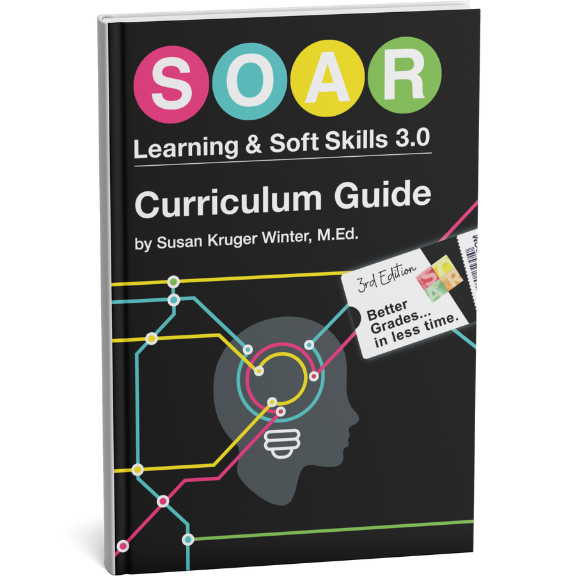Tips from an Award-Winning Teacher
I was happy to have the opportunity to talk with Elisa Collins, an excellent (and now award-winning) study skills teacher at Oasis Middle School in Cape Coral, Florida. It was an exciting chance to talk study skills and pick up some new teaching tips.
In 2012, Elisa was one of four teachers to win the Lighthouse Award, which the Cape Coral Municipal Charter School Foundation gives to outstanding teachers.

Elissa and her Lighthouse Award
When she won the award, Elisa had been using my SOAR® study skills curriculum for three years, so she was excited to tell me about her success – and I was very excited to hear about it!
A Growing Success
Elisa’s study skills classes had such good results that the school expanded the program dramatically. At open houses, parents at her middle school would ask for more emphasis on study skills. Her class started four years ago with 6th graders. From there it grew into the other middle school grades, then into the high school as well.
Elisa’s success, her school’s success, and especially her students’ success, all depend on understanding how important study skills are to learning. Because study skills aren’t a traditional school subject, skeptics thought the class might be an indulgence, or thought only struggling students would benefit from it. Elisa was emphatic that this wasn’t the case. “This is not remediation,” she said. “We are not cutting back. This is essential!”
Study Skills are Future Skills
For a long time I’ve said that the SOAR® study skills curriculum trains students in skills that will be relevant throughout their lives and careers. I learned for myself just how essential study skills are, and I re-learn it again and again as I watch elementary, middle, and high school students succeed with study skills.
As Elisa points out, “These skills last a lifetime.” It’s something to keep in mind as more and more people put forward different school improvement plans and school reform schemes.
“I really work hard with the students to make them rely on themselves,” Elisa told her local paper. “I am teaching them to be learners: how to learn strategically, organize themselves, process new information… and how to access it at a later time, to use these ‘superpowers’ to be successful in the 21st century, in this school, in high school and the future.”
She quoted education guru Karl Fisch to say, “We are currently preparing students for jobs that don’t yet exist, using technologies that have not yet been invented in order to solve problems we don’t even know are problems yet.”
In fact, her signature assignment gets students thinking about the changing job market and how their skills will fit into it. She assigns each student to find a career that exists today, but didn’t exist five years ago. Each student researches a career and reports on it, using the SOAR® writing system. What a great way to teach students how technology marches on!
Tips from the Classroom
Elisa shared some more tips with me on how she ran her award-winning study skills class.
First she introduces students to the theory of Multiple Intelligences to help them find their “superpowers.” Every student has unique skills that they can use to succeed in school, but if students don’t find their skills early on they may come to believe they are simply “bad at school.” It’s important to help students find their talents, both to build them up and to help them succeed.
A lot of her work with students involves teaching them to use planners. She has to fight some misconceptions to get them to do it. Many students think that they should be able to hold everything they need to do in their heads instead of writing it down. (Some of them, to be sure, would rather forget about their assignments than work on them anyway.)
The truth is that planners are essential to juggling multiple assignments. Elisa shows her students interviews with parents and other professionals to show that adults especially need planners to stay on top of everything they need to do. Planners free up important mental bandwidth – they let you stop using so much of your brain to remember what to do, and use more of your brain to actually do it.
To make sure her students keep their time and their work organized, she has class-wide planner and binder checks every other week. She has the students clean out their binders in class, too. Making the binders a part of class like this keeps students accountable and promotes good habits. It also encourages positive peer influence: students see how many of their peers are getting organized and how it’s helping them succeed.
Conclusion
It’s been a little over a year since Elisa Collins won her Lighthouse Award. I am glad to have been a part of helping her reach that level of success, and I’m also glad to learn what teaching tips she’s discovered along the way.
As teachers and advocates for our students, it’s important to remember how much all students – not just struggling ones – can benefit from a study skills curriculum. One of the most important skills to develop is how to use a planner to organize time and free up brain power.
It doesn’t hurt to recognize success. Showing parents their students’ study skills successes helps win their support for this vital part of education. Showing students their peers’ success will remind them of what they can accomplish. And I hope that seeing Elisa’s success can inspire some of us to do the same.
-Susan Kruger
EB 051517
Six Steps
Conquer the Chaos
Get Our Free Guide & Information on...

"*" indicates required fields
Get Our FREE Curriculum Guide!
The SOAR® Curriculum
The most critical learning, organizing, and communication skills needed for school. Learn more here.
Who’s Using SOAR®?
SOAR® Guarantee
Click here to learn more.




